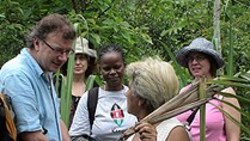
Andra AP-fonden kritiseras för affärer i Brasilien Henk Hobbelink from the organisation GRAIN, which supports small farmers, is critical of the Second Swedish Pensions Fund. Photo: Grain/Scanpix
GRAIN criticism
Pensions money invested in farmland abroad
Swedish pensions money is threatening the livelihoods of small farming communities in Brazil and risk speeding up the devastation of the rainforest. That is according to the organisation GRAIN, which this week received the Right Livelihood Award for its work to protect the livelihoods and rights of farming communities around the world.
But the Second Swedish National Pension Fund says it is doing what it can to oversee that its money is invested responsibly.
Radio Sweden`s Ulla Engberg filed this report.
Over the past few years, the non-profit organisation GRAIN has noticed a new trend. With the financial crisis hitting hard, giving markets the jitters, the need to find safe places to allow money grow has meant banks, investment funds and pension funds have turned to acquire food and farmland. It is seen as a safe haven, as "everybody has to eat".
But the result, according to GRAIN, is devastating for local farmers who are pushed out by big farm investors producing food for the foreign markets. Local farmers are forced to move from land where they have lived sometimes for generations. In Brazil, this affects also the rain forest, because when the farmland expands, more land is needed, and rainforest is being chopped down to acquire it.
GRAIN calls it the global land grabbing - turning farmers into refugees of their own land.
Earlier this week, representatives of GRAIN came to Sweden to receive the Right Livelihood Award in Stockholm. They had then taken the opportunity to look into any Swedish money going into this business.
One of the investors is the Second Swedish National Pension Fund, one of the biggest public pension funds in Sweden. They are currently investing in a farmland project in Brazil.
Kristina Olivecrona is an sustainability analyst with the Second Swedish National Pension Fund. "We have felt it important only to go into countries where the land rights are clear," she tells Swedish Radio's P1 morgon. She says they have also been instrumental in the work to formulate principles of responsible farmland investments for international pension funds regarding the environment, working conditions land rights, working conditions, human rights and business ethics. Investors who have adopted the principles have agreed to report how they follow these principles.
But, says the reporter Lasse Johansson, what about you indirectly threatening rain forest?
"We don't invest in rainforest areas," says Kristina Olivencrona.
"Well, but indirectly that is the effect, as others are forced to go there," the reporter pushes on.
"We can only take the responsibility for our investments," she says.
"But if it is an effect of your investments, don't you have a responsibility for it?" the reporter says.
"Well, it is an effect of the development of society as a whole," she says.
"But you are part of that," are you not?
"We all are," she says.
After a few more rounds, the reporter turns to Peter Einarsson, from the Swedish organisation of Organic farmers and former board member of GRAIN. He says he does not know all the details of the Second Pension Fund's investment, but that it is important to raise the more principled question. "Shall we really support this kind of development? I am not sure I want my money for foreign aid and pensions to be used for this," he says.
But, says the reporter, the Swedish agriculture has moved from small scale farming to larger scale, do you want to restrict their possibility for them to develop in the same way?
Peter Einarsson replies that the big farms in Sweden are no-where near the scale of the farms we are now talking about which are on tens of thousands of hectars. He says Sweden has clear restrictions on companies buying up forests and farmland, exploiting it to the detriment of smaller farmers.
"If we have certain moral principles for how farming and forestry is run in Sweden, we should not use public money to support that it is used in a completely different way abroad," says Peter Einarsson.













